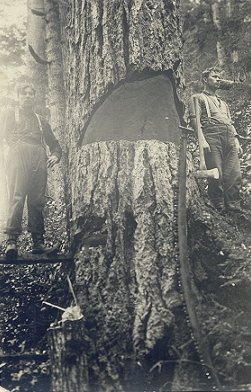 Just finished John Vaillant's The Golden Spruce, one of the more hyped non-fiction books of the year, and the latest in the Krakauer school of naturalist/investigative journalism bestsellers.
Just finished John Vaillant's The Golden Spruce, one of the more hyped non-fiction books of the year, and the latest in the Krakauer school of naturalist/investigative journalism bestsellers.The book is a good read, but surprisingly unsuccessful in it's attempts to peel back the layers of Grant Hadwin's psyche (something Krakauer did much better with Into the Wild's Christopher McCandless.) By the end of the book I was still scratching my head as to the nature of this guy's mentality, and not in a good way. Vaillant's research on Hadwin seems thin for a book of this size, and there are several "what the-?" moments because of it. The young, serious minded timber scout we are introduced to in chapter 3 is suddenly, in chapter 7, galivanting around Russia with a riding crop, spurs and a baseball cap festooned with needles and condoms. Vaillant offers up very little in way of explanation, or even conjecture, as to the reasons behind this massive shift in temperament.
The book is much stronger when it focuses on the history of the Queen Charlotte Islands, the logging industry, and above all, the natural world. Here's a sample passage that will resonate strongly with anyone who has ever canoed or kayaked the north coast:
"On the northwest coast, there is no graceful interval between the ocean and the trees; the forest simply takes over where the tidewrack ends, erupting full blown from the shallow, bouldered earth. The boundary between the two is unstable, and the sea will heave stones, logs, and even itself into the woods at every opportunity. In return, the roots of shore pine and spruce grope for a purchase on rocks better suited to limpets and barnacles while densely needled boughs cast shadows over colonies of starfish and sea anenomes. The air is at once rank and loamy with the competing smells of rotting seaweed and decaying wood. From the beach you can see as far as height and horizon will allow, but turn inland and you will find yourself blinking in a darkened room, pupils dilating to fill the claustrophobic void."
<< Home